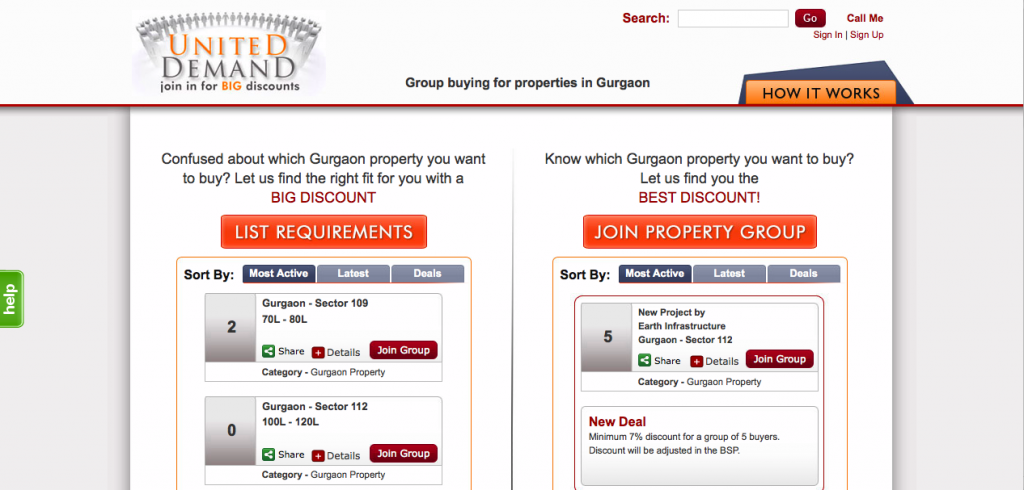 College student Karan Kanodia believes he has struck gold in the real estate market with his recently launched United Demand, an Internet-based business that brokers housing purchases between home buyers and developers in Gurgaon, India.
College student Karan Kanodia believes he has struck gold in the real estate market with his recently launched United Demand, an Internet-based business that brokers housing purchases between home buyers and developers in Gurgaon, India.
Kanodia hopes that United Demand, which he launched in March, will have a similar effect on the real estate market as Internet-based company Groupon has had on products and services, he said.
The goal of Kanodia’s business is to unite buyers and real estate developers in India, boosting sales volume for developers and creating savings for purchasers.
Users enter criteria on the United Demand Web site, including how much they want to spend, which sector in Gurgaon they wish to live, whether they are looking for residential or commercial space and how many square feet. The company then sets about finding other clients interested in the same property to add to what he calls “client groups.” Simultaneously, the company makes deals for the buyer groups.
Real estate developers and underwriters access the Web site in search of people to purchase either existing buildings or those under construction.
Kanodia, a 20-year-old business management major at Babson College who came to the United States from India in 2009 to attend the school, operates his business out of his dorm room in Wellesley. He employs one full-time employee in India who handles property scouting and focuses on client relationship-building. While his employee acts as his eyes and ears, Kanodia spends his nights placing calls to underwriters, developers and brokers in India. Kanodia and his employee find developers looking to sell multiple homes in one deal, in most cases apartments. Kanodia then posts the particulars on the United Demand Web site. Developers also contact Kanodia with properties — some still in construction phase — they want to advertise to would-be buyers.
Kanodia is focusing on the real estate market in India with good reason: the market there is more difficult to navigate than in the United States, and he believes there is demand for any service that can increase the efficiency of the process. He describes the real estate industry in India as haphazard and without a formal body to regulate transactions with developers and brokers all playing by different rules, opening the door to the potential of cheating buyers, according to Kanodia.
In addition, Gurgaon is an attractive spot around which to operate since it has been undergoing a surge in the sale of homes over the past 15 years or so, according to Kanodia.
Launching his business now, he hopes to capitalize on skyrocketing home prices in Gurgaon by trying to offer his customers lower prices — and even though he has two years left before he graduates from school, he is convinced his decision was a good one, he said.
Through his father, who lives in Uttar Pradesh and works as a real estate developer, Kanodia has seen the trend of properties doubling in price in recent times. Using his father’s real estate connections has helped Kanodia put United Demand on the path to capitalize on such trends.
However, he said that, despite having a personal inroad into the real estate industry in India, what really caused him to launch United Demand was his observation that he could apply the Groupon idea to selling homes.
Kanodia has chosen to deal with Indian clients and developers because he recognizes the difficulty in investing in India’s real estate market from the United States. He adds that any potential client anywhere interested in buying a property in India can do so through United Demand, but for the time being he is throwing his weight behind an Indian clientele base.
“For a [non-resident Indian] to partake in the real estate market [in India]it takes thousands of dollars. They don’t know where they’re money is going. It’s scary,” he said. And Kanodia admits his business plan does not include perks such as property management that he says would entice Indian-Americans to purchase property overseas in India.
Kanodia says he is keeping an open mind about possibly expanding his business to include real estate in the United States but he does not think there is demand in the housing market to warrant it, for now.
“I’m skeptical because of the lack of demand for apartments here,” said Kanodia.
While he is still working out exactly what benchmarks United Demand will have to hit in order for him to view his business as a success, he says he is fully prepared to return to India after graduating college if United Demand takes off.
Kanodia says his first deal, with Earth Infrastructure Pvt. Ltd., is set to close by early April. According to him, the buyers will receive about a 3 percent discount on the price of the property.
Going forward, he envisions a typical transaction will include five or so buyers looking to purchase real estate, saving on average between 5 percent and 20 percent of the cost of more traditional real estate transactions, according to Kanodia.
For now, Kanodia is not worried about the real estate bubble bursting like it did in the United States and adds that there is no dearth of prospective buyers.
“Real estate might be [overvalued]because of investor speculation, but the middle class standard of living [in India]is growing day by day,” he said.





